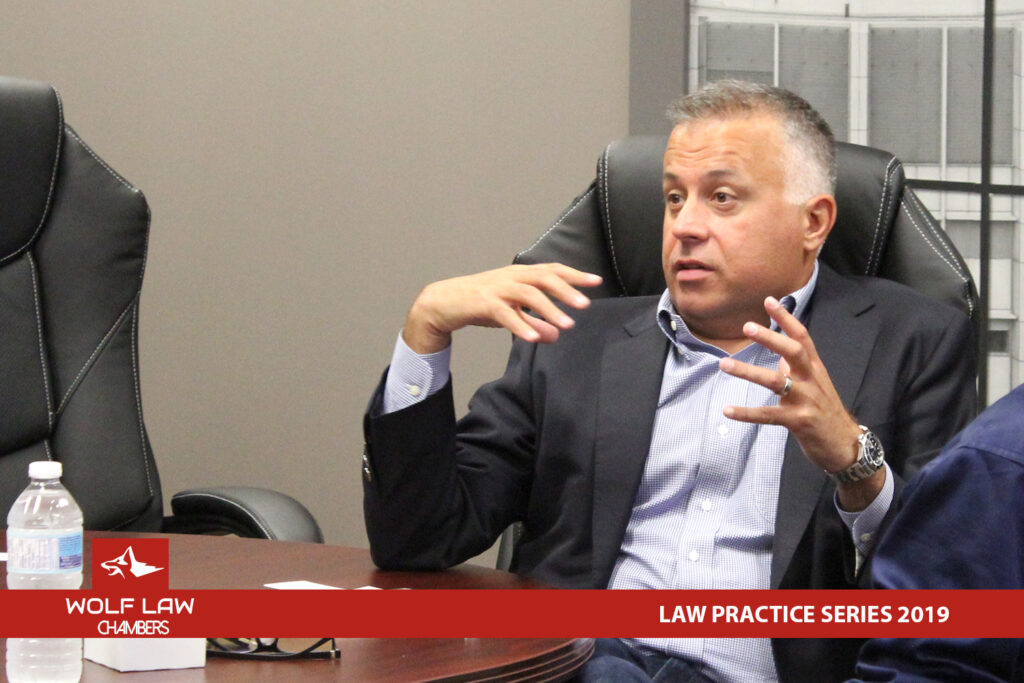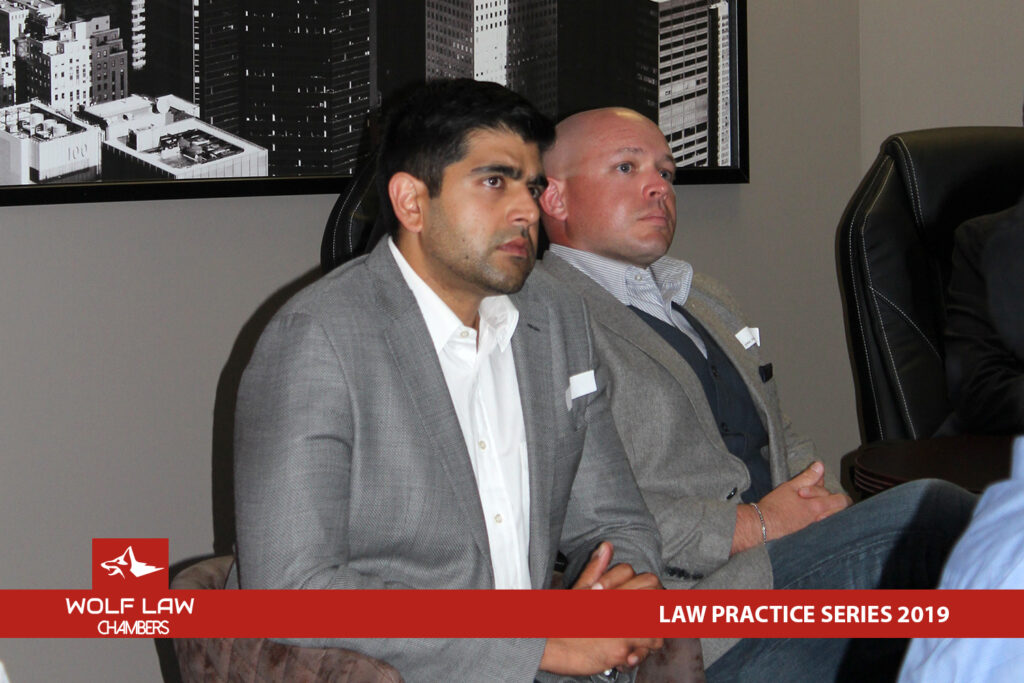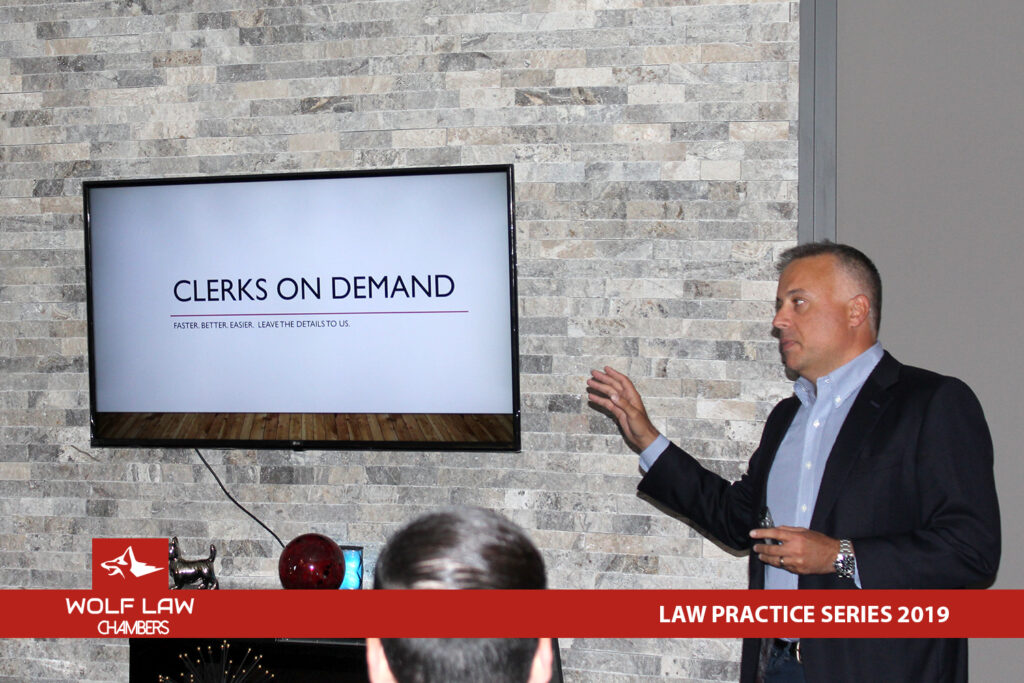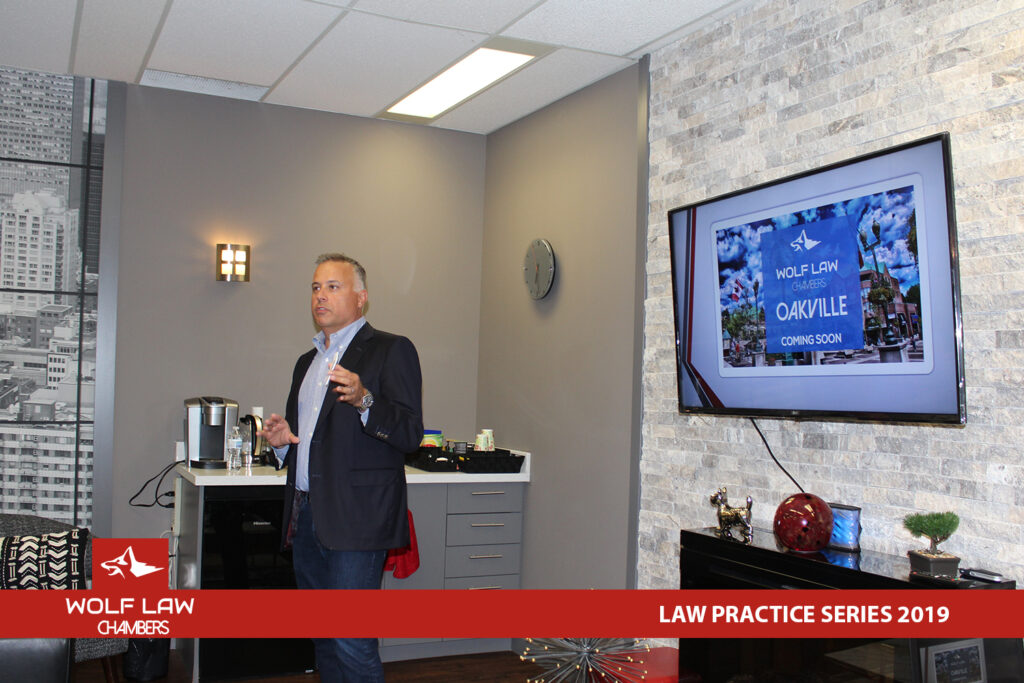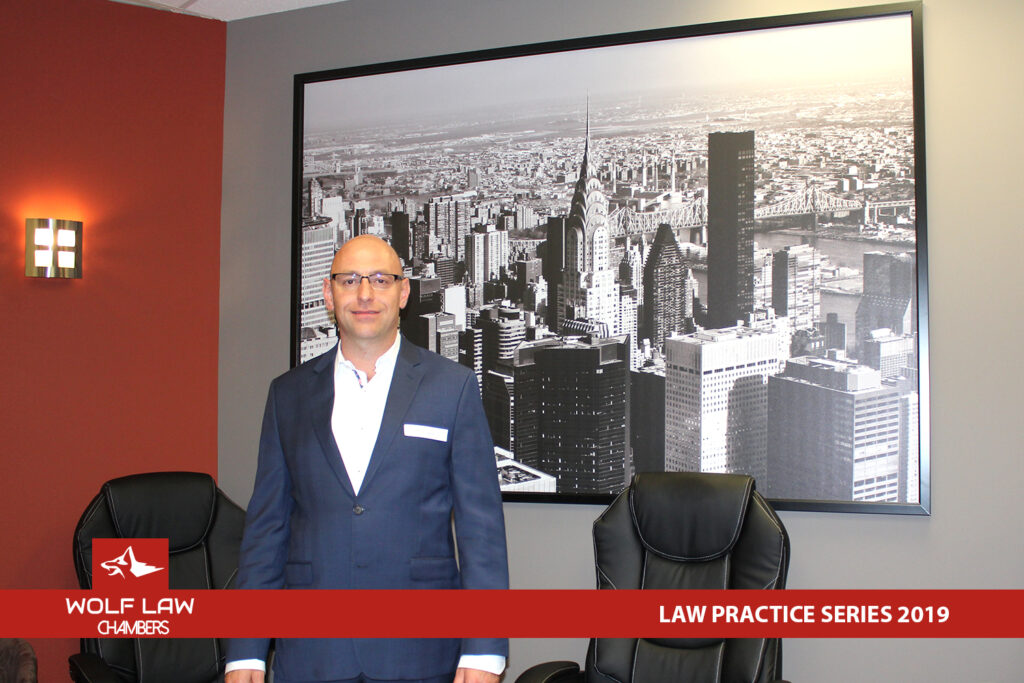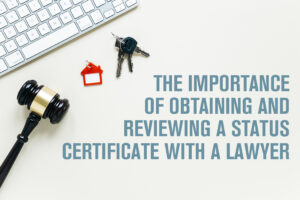Archive for August 2019
Mental health and wellbeing in the legal profession
In a profession that demands for you to be meticulous throughout every moment of your day, there is an enormous amount of pressure that undeniably exists. Can the continuous pressure of rushed deadlines, liabilities for oneself and others, dreadfully long work hours, stiff competition, dismissal of emotion from sensitive client matters, isolation, and/or sleep deprivation take a toll on a lawyer’s mental health and wellbeing? They most definitely can! The legal profession is one that requires psychological stability, but mental health is often neglected by those in the profession.
Lawyers are typically immersed in the vocational and theoretical aspects of their trade but are not equipped with the tools to maintain balance and focus in high stress professional environments [1]. In order to address the situation, professionals must concur to destigmatize the current views surrounding mental health. Only then can we open the door for discussion, resolution, and change the status quo.
Former President of the American Bar Association (ABA) had the following to say:
Lawyers, judges and law students are faced with an increasingly competitive and stressful profession. Studies show that substance use, addiction, and mental disorders, including depression and thoughts of suicide—often unrecognized—are at shockingly high rates [1].
Former President of the American Bar Association (ABA)
These findings are not surprising considering the daunting challenges that surround the legal profession. About 44% of lawyers recently surveyed by the ABA said that they would not recommend their profession to a young person [2]. That is quite the irony, now isn’t it; diving into a career path that you would advise others not to partake in. It is vital to understand why the profession has become so toxic and why lawyers are among the top three professionals to face substance abuse issues [2]. Only by doing so, can we develop solutions and coping mechanisms which may build resiliency amongst lawyers and prepare them to tackle stressors more effectively. Neglecting the data and the stigmatization of such health concerns is not going to solve the issue at hand, and has probably done more harm than good.

In order to address a problem, its existence must first be acknowledged. Only then, can we proceed with devising a solution and executing it to the fullest extent available. Approximately 58% of lawyers in Canada have faced stress and burnout, 48% have experienced anxiety, and 26% have experienced depression [3]. These statistics were derived from a survey conducted in 2012 but they are not irrelevant to the concern that exists in the profession regarding mental health today. Lawyers are definitely on the edge with the type of matters they deal with on the daily and it may be of benefit to implement coping mechanisms to prevent such conditions of stress/burnout, anxiety, and depression. On April the 6th of this year, the Canadian Bar Association hosted its first-ever Health and Wellness Conference, a pivotal step in the right direction [3]. The conference dove into some of the most pressing issues faced by lawyers with an emphasis placed on mental health concerns. Traditionally, those in the legal field had turned a blind eye to the day to day stresses involved with their jobs, and the potential detrimental effects they had on the psychological well being of individuals. But as more awareness continues to be raised, lawyers will realize that they are definitely not facing these issues alone, creating room for the discussion and implementation of preventative measures.
Some practices include, but are not limited to, adequate sleep, exercise, external support, social participation, vacations/extended breaks, mindfulness, flexibility, workload management, and/or seeking professional help [4]. The definition of mindfulness, as written in the Oxford Dictionary of English is, “A mental state achieved by focusing one’s awareness on the present moment, while calmly acknowledging and accepting one’s feelings, thoughts, and bodily sensations, used as a therapeutic technique [5].” To dwell in the present and acknowledge one’s mental and physical state of being constitutes to being mindful. In doing so, one is able to immediately understand how they feel, and asses if there is need to take action. Once that is taken care of, there are many coping mechanisms that can be put to practice. Rest is definitely vital in performance and sometimes you may have to step away from your professional practice to take a break and revitalise your mind and body [4]. Speaking to loved ones can lessen the burden and help get a load off your chest. It has even proven to reduce the body’s physiological response to stressful events [4]. Lawyers can speak to loved ones, whose opinions they regard and weigh considerably, to help them cope with a dilemma. If that does not work to any avail, they can always pursue the services of a certified mental health professional. There are many support groups, within and outside the legal community, where they can get aid. Next, remaining flexible allows one to meet the shifting demands of their environment [4]. This is definitely relevant for lawyers who deal with a variety of complex matters. Focusing solely on the aspects of a situation you can reasonably expect to influence, paves the way for the process of eliminating things that may induce stress [4]. Last, but definitely not the least important, is the ability to manage one’s workload. Do not overload your schedule with client files and matters you cannot handle. It is completely rational to ask for help and outsource your work to create balance and become more efficient. Schedule yourself in such a manner that you can handle your workload and balance life outside of work. Do not be overwhelmed, so that you give yourself more openings to remain stressed.
To conclude, mental health is a serious concern for lawyers and legal professionals alike. If you ever feel that coping with adversity is too formidable a task, please seek help immediately! Remain mindful of your physiological and mental well being, acknowledging any negative changes in mood, behaviour, and habits. Then, carefully cultivate and strategize techniques to cope with such changes. You may be able to do so using techniques already in place or by seeking professional help. The Canadian Bar Association’s Legal Profession Assistance Conference (LPAC) says that they are, “Dedicated to helping lawyers, judges and law students and their families with personal, emotional, health and lifestyle issues through a network of Lawyer Assistance Programs, a national 24-hour helpline and through provincial programs [4].” Do not neglect your mental health and wellbeing! Please take initiative and use these resources which are so readily available.
[1] Lefkowitz, Dena. ‘Investing in Lawyer Well-Being-Why It Matters’, (2019), The Legal Intelligencer. https://www.law.com/thelegalintelligencer/2019/08/14/investing-in-lawyer-well-being-why-it-matters/ [2] Kane, Sally. ‘The 10 Challengers About a Career As a Lawyer’ (2019) the balance careers. https://www.thebalancecareers.com/lawyer-career-drawbacks-2164594 [3] Ashley Pollack, Candice. ‘Mental health in the legal profession: Are we asking the right questions’ (2019) The Canadian Bar Association. https://www.cba.org/Sections/Young-Lawyers/Articles/2019/Mental-health-in-the-legal-profession-Are-we-aski [4] Kelly, Owen. ‘Coping with Stress and Avoiding Burnout: Techniques for Lawyers’. (2009) The Canadian Bar Association. https://www.cba.org/Publications-Resources/CBA-Practice-Link/Work-Life-Balance/Health-Wellness/Coping-with-Stress-and-Avoiding-Burnout-Techniques [5] Oxford Dictionary of English. 3d ed. Sub verbo. ‘Mindfulness’.-Narvir Goindi
Networking Event – Legal Outsourcing vs. Hiring New Talent
Thank you to our fellow sole practitioners, the marvellous Peter Carayiannis from Conduit Law, and most welcomed guests for joining us on Thursday, August 15th, 2019 at Wolf Law Chambers. The topic of discussion for our event was the practicality that lies in outsourcing legal work in comparison to hiring new talent. Initially, sole practitioner, Dezso Farkas, of Farkas Legal Professional Corporation, spoke on the misconceptions in the legal field about outsourcing tasks to staff or legal clerks.
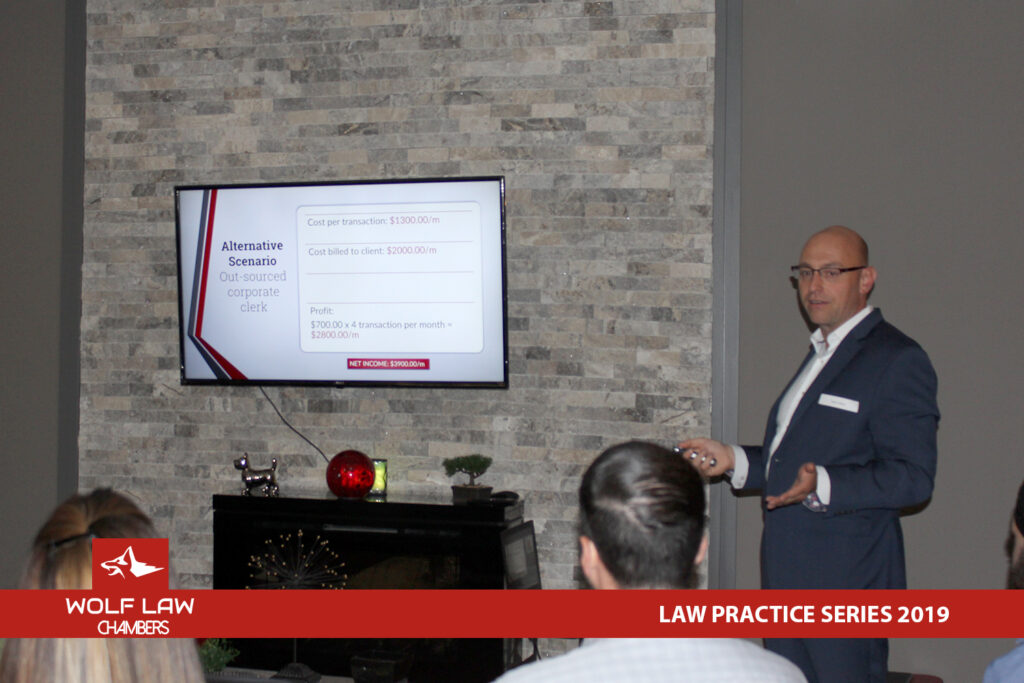
He explained how sole practitioners have a false perception that entails them carrying out every task that is part of the profession. Doing so, takes up a significant portion of their day and they are left with little to no time for billing clients. Mr. Farkas used accurate figures and analysis to depict how hours spent on practice management can be outsourced to staff and/or legal clerks to spend more time on actual legal work that can be billed. This leaves room to yield higher returns immediately, and is significantly compounded over longer durations of time. Legal outsourcing may seem like a discouraging practice as one has to shell money out of their pocket at first, but the time left to actually work on files and bill clients summons more profits for legal professionals.
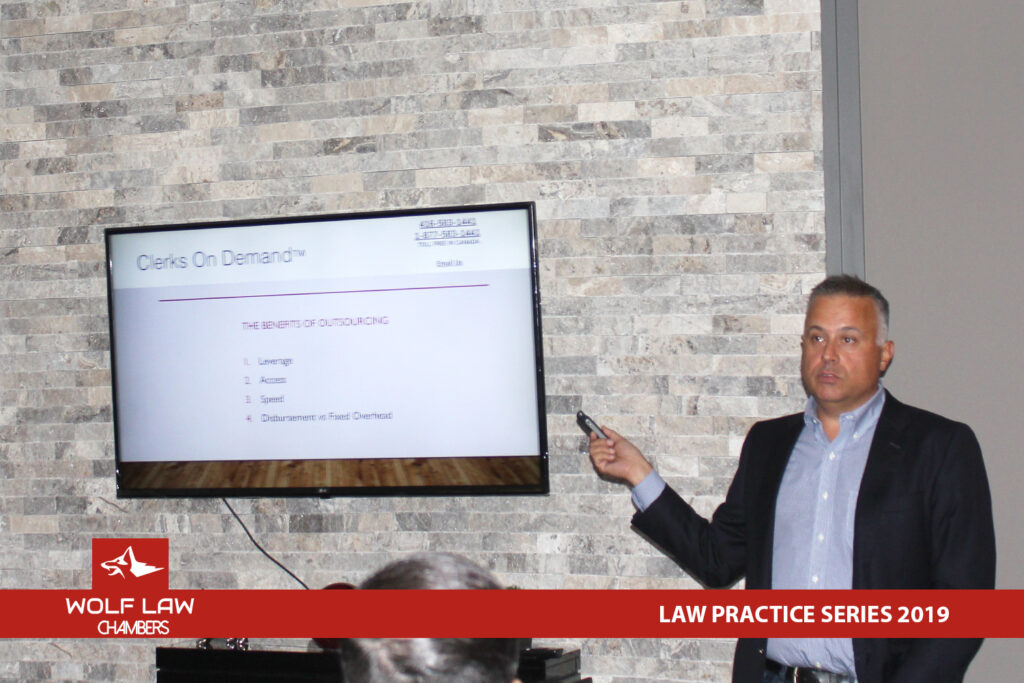
Peter Carayiannis from Conduit Law and Clerks on Demand outlined the many advantages legal outsourcing can have on one’s legal practice. He explained the differences between hiring new talent and outsourcing tasks to a company like Clerks on Demand. Essentially, hiring new talent thoroughly involves a recruitment process, training that has to be given, dealing with employee needs, and the constant thought of an employee leaving, leading to the whole process occurring again. Legal outsourcing, on the contrary, encompasses the passing of particular tasks to a professional and certified legal clerk, who is capable/experienced enough to complete assignments on their own. They can even be hired for a particular task or a specific period of time, allowing sole practitioners to leverage their time accordingly. Lawyers can then apply themselves to other facets of their practice, which in turn, allows for a yield of more returns. Peter brought up an interesting point during his presentation. He insisted that the audience understand the practicality behind outsourcing certain tasks of their legal practice. If a lawyer is not serving their client’s needs by performing a certain task, it should be outsourced to a legal clerk who can take care of it, while the lawyer works on more important matters, that serve the client’s legal needs directly.
Many of the sole practitioners present at the event saw the immediate benefits from outsourcing various areas of their practice to staff or legal clerks, and by doing so, being able to better focus and serve client needs. Some lawyers even noted the benefit in taking on more tasks than they would normally be able to handle by simply hiring clerks. Peter’s company, Clerks on Demand, allows lawyers to do exactly that. They can hire clerks at any time to assign tasks that they may not want to carry out and/or have the resources/time to complete. They would still be able to supervise all operations without having to indulge completely. With that said, any aspect of legal practice that does not serve the purpose of going to law school and receiving a legal education, can be contracted out, allowing lawyers to leverage their time accordingly.
A workspace designed to provide sole practitioners many opportunities to leverage their time efficiently is Wolf Law Chambers. The Wolf Law Chambers team incorporates innovative technological practices in their office to allow for rapid communication between lawyers, staff, and clientele. They also offer many services to sole practitioners deciding to join them, such as easily accessible office coordinators, marketing specialists, and process servers. These individuals are staffed to allow lawyers within the chamber to focus on what really matters: serving their client’s needs and executing the legal work that they specialize in.
We loved the turnout for the event and hope to continue seeing both familiar and new faces for the future. We have a workshop coming up again on Tuesday, August 27th, 2019 from 6-9 P.M. with guest speaker, Humza Adam of HFactor Solutions. Humza will be providing business development and marketing strategies for both lawyers and paralegals. We hope to see you soon!

Come in and see the exceptional services Wolf Law Chambers has to offer for you and your clientele. Currently, there is a Wolf Law Chambers location in the heart of Mississauga, and we are proud to announce the opening of another location at 227 Lakeshore Road East, Suite 408, in downtown Oakville. Wolf Law Chambers is dedicated to being easily dependable and providing sole practitioners with all the resources they need to succeed in the legal profession. Please feel free to book a tour and join us in building a community of sole practitioners striving to set new standards.
Common Law Removal of Estate Representatives
Experts within the field of Estates Law understand the courts in Ontario have jurisdiction to remove personal representatives of an estate, pursuant to Section 37 of the Trustee Act. If removal is necessary, then the lawyer may submit a Notice of Application for removal under rule 14.05(3)(c) of the Rules of Civil Procedure. This has been followed in several cases, including Johnston v Lanka Estate, 2010 ONSC 4124. However, we must not forget that there is more to law than legislation. In Canada, we have the common law, deeply rooted in the common law of England.

SIR DAVID WILKIE (1785-1841)
Oil on canvas | 152.7 x 239.0 cm (support, canvas/panel/str external) | RCIN 404710
Inherent Jurisdiction
The courts of Ontario have an inherent jurisdiction to remove personal representatives without relying on any statute. This goes at least as far back as 1884, when the Privy Council of the United Kingdom, in Lettterstedt v Broers, (1884) 9 App Cas 371 (South Africa PC), was faced with the question of whether to remove the trustees of an estate. An appeal to the UK Privy Council had been allowed in relation to a matter heard in South Africa at the Supreme Court of the Cape of Good Hope, pertaining to an action brought by a beneficiary of a will for an investigation of accounts since the trustees had started acting as executors. The beneficiaries alleged misconduct on the part of the trustees, which was used to support their argument for the removal of said trustees.
The Court relied on its main guide: the welfare of the beneficiaries and the protection of the trust estate. Furthermore, it is the principal duty of the Court of Equity to see that the trusts were properly executed. In order to ensure that this duty was performed, in the within case, the Court found that it needed to remove and substitute the trustees.
This case was followed in Re Thorpe, [1929] OJ No 247, where the Ontario Supreme Court (High Court Division) argued against the removal of an executor on the basis that the applicant failed to establish the grounds for removal. Despite the lack of removal, the Court outlined its grounds for removal in paragraph 10, which states:
To remove an executor named in a will, to whom a court of competent jurisdiction has issued probate, it must be established that the executor – who must always act for the benefit of those beneficially entitled – has refused to execute the trusts under the will, is a bankrupt, is incompetent or incapable, is an infant, is in prison, or has acted dishonestly in the administration of the estate.
The Court then provides the following references as its source of authority: “Reference to Letterstedt v. Broers (1884), 9 App. Cas. 371; In Bonis Hett (1842), 6 Jur. 350; Forster v. Davies (1861), 4 DeG. F. & J. 133; In re Wrightson, [1908] 1 Ch. 789, 803; Harris v. Gallimore (1895), 57 O.L.R. 673”
This is in contrast to another case like Re Anderson, [1928] OJ No 168, where the court sources its authority to remove a personal representative of an estate on Section 36(1) of the Trustee Act, RSO 1927 ch 150 (now Section 37 of the Trustee Act, RSO 1990, c T23). Though the grounds were common law principles, the source of authority was statutory. This is very different from Letterstedt or Re Thorpe, where the courts relied on their inherent jurisdiction to decide whether to remove an estate trustee or executor from representing an estate.
Another case by the name of Brewster v Hendershot, [1900] OJ No 25, in paragraph 20, states as follows:
the Court, even assuming that the plaintiffs are not the legal trustees, has power to, and should, remove the defendants and appoint the plaintiffs trustees of the property in question.
In other words, the Court has the power, and should have the power, to remove and appoint personal representatives of an estate. This is further implied in the earlier case of O’Brien v Clarkson, [1884] OJ No 84.

Picture, 1899, English
Concluding Remarks
Statutory law is not always the source of our law. Sometimes, a statute is but an expression of the underlying principles of common law or equity. Codified for all to see, statutory law is a helpful tool for understanding what the laws are as explicitly stated. However, the existence of statutory law does not eliminate the source of the common law or the laws of equity. Judge-made law remains law in Ontario. This is expressed in Section 96(1) of the Courts of Justice Act, which states:
Courts shall administer concurrently all rules of equity and common law. R.S.O. 1990, c. C.43, s. 96(1); 1993, c. 27, Sched.
So when battling to remove or substitute a trustee or executor of an estate, let it be known that the common law and equity still lives. In addition to Sections 37 or even 5 of the Trustee Act, the courts may rely on its inherent jurisdiction to remove or substitute a personal representative of an estate.
-Aaron Rajesh
The Advantages of Incorporating your Professional Practice
Since November 1st, 2001, professionals have been entitled to incorporating their practice under the Business Corporations Act as provincial governments changed their incorporation laws to include professionals [1]. Incorporating a professional practice is a pivotal step forward in securing financial advantages. Whether it be through tax deferrals, individual pension plans, health and welfare trusts, the lifetime capital gains exemption, and/or limited shareholder liability, incorporating enables professionals to benefit from potential advantages that would not be available if they operated under sole proprietorship.

Tax Deferral
Tax legislation makes a corporation a separate taxpayer and its own legal entity [1]. Deferring taxes may single handedly be the most beneficial aspect of incorporating your legal practice. The income earned within a corporation is taxed at two separate levels: at the corporate level and then again at the personal level when the income gets distributed [2]. Once you incorporate, tax rates for the corporation become significantly lower than personal tax rates. There is flexibility that lies in deferring personal taxation as corporate surplus inside the corporation. This can defer one’s personal income taxes and although these tax-deferred funds will be withdrawn at some point in time, it is clear that the compounding effect can be very beneficial over long periods of time [3].
Income earned from operating your professional practice within a corporation is taxed at a lower corporate tax rate than the income you may earn under sole proprietorship. Sole proprietors are taxed at an individual marginal tax rate, for which the highest marginal tax rate for individuals in some provinces and territories was higher than 50% for 2018 [4]. The marginal income tax rate will increase for an individual as income increases. On the contrary, professional income earned within a corporation is subject to being taxed at a lower corporate tax rate. In 2018, this rate ranged from 26.5% – 31%, which is significantly lower than the former figure [5]. Lower corporate tax rates for active business income leaves professionals with more after tax income within the corporation to invest at their discretion.
Furthermore, corporations that are legally defined as a Canadian controlled private corporation (CCPC), can benefit from the federal small business deduction. This benefit lowers the tax rate even further on the first $500,000 of active business income [4]. This figure is known as the ‘business limit’ and it varies by province/territory. The small business deduction rate also varies by province and territory, and the combined federal and provincial tax on income subject to the small business rate ranged from 12% to 22% in 2018 [5]. That is definitely not bad a tax rate that would otherwise be 38%, which is what the corporate would have to pay according to Part I of the Income Tax Act [2].
| Small Business Deduction Limits/Rates (2019) | Small Business Limit | Rate % | Combined Fed/Prov. Rate% |
| Federal | $500,000 | 9.00 | |
| Provincial: | |||
| Alberta | $500,000 | 3.00 | 12.00 |
| British Columbia | $500,000 | 2.00 | 11.00 |
| Manitoba | $425,000 | 0.00 | 9.00 |
| New Brunswick | $500,000 | 2.50 | 11.50 |
| Newfoundland and Labrador | $500,000 | 3.00 | 12.00 |
| Northwest Territories | $500,000 | 4.00 | 13.00 |
| Nova Scotia | $350,000 | 3.00 | 12.00 |
| Nunavut | $500,000 | 4.00 | 13.00 |
| Ontario | $500,000 | 3.50 | 12.50 |
| Prince Edward Island | $500,000 | 3.50 | 12.50 |
| Quebec | $500,000 | ||
| Without MPP* | 8.00 | 17.00 | |
| MPP* | 4.00 | 13.00 | |
| Saskatchewan | $500,000 | 2.00 | 11.00 |
| Yukon | $500,000 | ||
| Without MPP* | 2.00 | 11.00 | |
| MPP* | 1.50 | 10.50 |
*Manufacturing and Processing Profits Tax Credit

IPP’s
An individual pension plan (IPP) is specifically designed for an incorporated professional and/or business owner of an incorporated company, age 40 or over [1]. With that said, it is not to say that someone under 40 cannot contribute to an IPP. An IPP is funded by corporate assets with the intention of providing post-career income to the contributor. IPP investments grow on a tax-deferred basis and usually provide higher contributions than those permitted by Registered Retirement Savings Plans (RRSP’s) [1]. Additionally, fees incurred from setting up and administering an IPP are tax deductible by the employer [1].

Health and Welfare Trusts
A health and welfare plan is a corporate arrangement set up by the employer and can provide employees compensation for medical and/or dental expenses. Coverage extends from the incorporated professionals to those employed by the corporation. This plan can provide coverage for medical expenses incurred outside of provincial or insurance plans. This tax-free benefit can make medical and dental expenses tax deductible for the corporation [5].

Lifetime Capital Gains Exemption
Each Canadian was entitled to a capital gains exemption of up to $848,252 in 2018 and this figure is indexed annually [4]. The Lifetime Capital Gains Exemption (LCGE) enables shareholders to reap the benefits of significant tax breaks on capital gained through the sale of private company shares. This is solely applicable to qualified small business corporation sales but is a benefit every Canadian is entitled to. Family members who own shares of a single professional corporation can multiply the LCGE available upon the sale of the qualified small business corporation, resulting in significant tax savings [3].

Limited Shareholder Liability
Incorporating your professional practice limits the liability of the corporation’s shareholders. Unless a shareholder has provided a personal guarantee, they are not subject to responsibility for the corporation’s liabilities. Nonetheless, a professional corporation does not protect individuals from personal liability for negligence [5].
Closing Remarks
Incorporating your professional practice provides endless potential for possible tax breaks, retirement savings, health benefits, minimizing capital gains on the disposition of private company shares, and protection from potential legal liabilities. With that said, professionals operating in different fields should definitely consider incorporating their practice as it is a simple process that presents an abundance of opportunity for one’s welfare. If you are still not sure about what incorporating can do for you, contact a professional who knows exactly how to help.

Greater Toronto Area based lawyer, Dezso Farkas, who operates under FARKAS LEGAL PROFESSIONAL CORPORATION, has helped many professionals incorporate their practice from start to finish. He has advised corporations and caters his services to their needs in order to maximize potential benefits. He believes in helping businesses grow and enabling business owners to benefit from the advantages that can be sought through incorporation. For professional advice please feel free to contact Mr. Farkas at (416) 735-6645.
-Narvir Goindi
[1] RBC. ‘Is incorporating your professional practice right for you?’ (2018) 6:2 Investment, tax and lifestyle perspectives from RBC Wealth Management Services. https://www.rbcwealthmanagement.com/ca/en/research-insights/is-incorporating-your-professional-practice-right-for-you/detail/ [2] Service Ontario. ‘Incorporating a business corporation’ (2019) Business and economy. https://www.ontario.ca/page/incorporating-business-corporation [3] Rotfleisch & Samulovitch P.C. ‘Lawyers Advantages of Incorporation – Ontario Tax Lawyer Comments’ (2019) Taxpage.com. https://taxpage.com/articles-and-tips/incorporation/lawyers-advantages/ [4] TurboTax Canada. ‘Lifetime Capital Gains Exemption’. (2019) SAVINGS & INVESTMENTS. https://turbotax.intuit.ca/tips/lifetime-capital-gains-exemption-6258 [5] Acton, Alan. ‘Should you incorporate your legal practice?’ (2010) CANADIAN LAWYER. https://www.canadianlawyermag.com/news/general/should-you-incorporate-your-legal-practice/267749The Importance of Obtaining and Reviewing a Status Certificate with a Lawyer
It is not information itself but how we use it that defines our prudence. An overload of information will lead to poor decisions, despite any lucky benefits, since too much information is equivalent to no information, and any decision based on no information cannot be prudent but only speculative. The same can be felt by the lay potential buyer of a condominium unit who obtains a Status Certificate for determining whether to buy a unit for residence or for investment. Reviewing a Status Certificate may seem like information overload to someone who has not been trained for such a task. Thus, in such circumstances, the best approach may be to consult a lawyer who is knowledgeable of the nature and implications of the Status Certificate’s contents, for they would know how to use the information provided in the document.
Status Certificate
A Status Certificate is a document which provides potential buyers with the current legal and financial “status” of a condominium unit along with some information about the condominium corporation, which is made up of owners of the condominium. It a snapshot of the corporation and unit’s position at a given time.
A document analogous to the Status Certificate is the Annual Report of a public corporation, which contains financial statements, ongoing legal matters, and other sets of information which give potential investors a clearer picture of the business of concern. Potential investors, who are looking to be shareholders or creditors, would look to this Annual Report to gather the insights they need to make a smart investment decision. Unfortunately, not everyone knows what to look for when analyzing the Annual Report; and not everyone knows what to do despite having the necessary information in front of them.
Similar can be said to the potential buyer of a condominium unit. Upon request to the condominium corporation which owns the unit of concern, the corporation will give the requester a Status Certificate, with a specified date, containing the information listed under section 76 of the Condominium Act. The main elements of the document can be stated as follows:
- The Scope of the Unit;
- The Budget and Financial Status;
- Any Ongoing Legal Proceedings;
- Rules, Regulations, and Restrictions; and
- Insurance Requirements for owners.
Scope of the Unit
It is important for every potential buyer to consider what the unit of concern entails. Does it come with a parking unit; or perhaps a locker? The Status Certificate will confirm the legal description of the unit, including lockers or parking units. This can be important for consideration, as in some cases parking units or locker units are not owned but are instead used by the seller. Only a careful review of the Status Certificate and accompanying documents will confirm just what the seller owns and what exclusive rights are transferable to the buyer. Once confirmation is made, the potential buyer can be one step closer to being a prudent buyer.

Budget & Financial Status
The Status Certificate provides the potential buyer with the common expenses of the respective condominium unit. The document also provides any increases to the common expenses for the unit that the board has declared since the current fiscal year’s date of the budget of the corporation, along with reasons for such change, pursuant to section 76(1)(b) of the Condominium Corporation.
Moreover, while common expenses of the past are important for consideration, reviewing the current budget will also shed some light into the budgeted expenses for the condominium corporation as a whole, which provides valuable insight to the potential buyer regarding the corporation’s financial priorities for the future. It might also provide an intimation to how well the condominium corporation manages the business and its units.

In addition to the common expenses and budget, the reserve funds can provide some interesting information. In essence, it is a special account from a financial institution (i.e. bank) which is separate from the condominium’s operating fund. This special account would be used for major repairs and replacements within the condominium units. It is analogous to an emergency fund. Reviewing the reserve fund can be important for the potential buyer because, supposing the potential buyer one day becomes the new owner of the unit of concern, the answer to whether the condominium corporation can quickly repair or renovate as required may vary depending on the amount of money kept in the reserve fund. Without proper consideration of the implications of the particular amount of monies held in the reserve fund, it can be quite difficult to make a prudent purchase of the condominium, for the reserve fund analysis can be crucial when determining whether the purchase of a condominium unit was worth its price.
Legal Proceedings
The main questions regarding legal claims is quite simple: is the condominium corporation involved in any legal proceedings before the court, arbitrator, or administrative tribunal? Are there any judgments outstanding? What about liens or special assessments? Answering these questions can reveal any red flags that the potential buyer should be aware of before signing the purchase agreement. All legal questions should be pointed to answer to the ultimate question of whether the purchase of a particular condominium would be prudent. This is best achieved by consulting a lawyer.
Rules, Regulations and Restrictions
The question of whether the corporation has faced or is facing material legal problems can be followed by the question of whether there are any laws that unit owners must follow during their time of ownership. This would be very important to know before making any purchase, since such rules and regulations may constrict the intended behaviours of future unit owners. For example, a potential buyer could have purchased a condominium unit for the sole purpose of renting out the space to tenants. However, if the rules of the condominium corporation dictate that there shall be no tenants, then the purpose of the purchase is rendered meaningless, though the term against tenancy may be enforced under contract law.
Furthermore, suppose the potential owner has a pet dog. It would be quite important for the potential buyer to know the restrictions on keeping pets within the respective unit, notwithstanding whether such restriction is based on animals, breed, size or something else. Thus, a thorough review of the rules disclosed through the Status Certificate would provide the potential buyer with the information to properly determine whether their intended use for the property of concern would comply.
Insurance Requirements
Needless to say, insurance is important; and a brief review of the condominium declaration can provide clarification to the potential buyer on the insurance coverages that a current owner is required to obtain. Typically, a condominium corporation maintains comprehensive insurance for the building and its common elements. However, unit owners are often required to obtain coverage for their personal property, and for liability relating to incidents within the purchased condominium unit. Discussing these insurance requirements with an insurance agent during the conditional period will allow a prospective buyer to determine whether they will be able to obtain the required coverage and associated costs.
Concluding Remarks
Not everyone knows what to look for when analyzing the Status Certificate; and not everyone knows what to do despite having the necessary information in front of them. It is not enough to obtain and review complicated information alone, just as it is not enough for the lay reader to understand the implications of the information written in an Annual Report or a medical report. Someone reviewing an Annual Report would be prudent in seeing an expert in Accounting, Finance or Law. Someone reviewing a medical report would be prudent in consulting a doctor. Likewise, the potential buyer of a condominium unit would be prudent in reviewing the Status Certificate with an expert in the field of Real Estate Law. Thus, seeking consultation with a lawyer on the Status Certificate can be the best approach in making a well informed prudent purchase of a condominium corporation, whether it be a new home or a new investment.
-Aaron Rajesh








